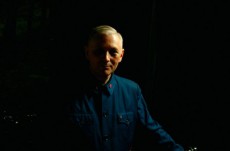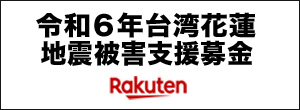14 Issue:Mark Reeder(Record producer, Remixer, Musician and Record label owner)
NeoL / 2019年8月27日 17時0分
年齢は単なる数字であって、オトナになるという境界線は人ぞれぞれ。定義できないからこそ、誰もが答えを探している。多感で将来のことを考え始める14歳の頃、みんなは何を考えて過ごしたのか?そんなファイルを作りたいと始まった「14歳」特集。東京、NYに続くベルリン編には、年齢やバックグラウンド、仕事の異なる個性豊かな15名をピックアップ。
14本目はイギリス人音楽プロデューサー兼ミュージシャン、マーク・リーダー。1978年に生まれ育ったマンチェスターから西ベルリンへ移住、瞬く間に現地のコミュニティの一員となりこの街を見守ってきた。ベルリンをはじめ世界中の初期エレクトロミュージックシーンとDJカルチャーにおいて尽力してきたキーパーソンと言っても過言ではない。近年、70年代後半から80年代のベルリンを描いたドキュメンタリー映画『B-Movie: Lust & Sound in West-Berlin 1979–1989 (2015)』の顔として再びスポットライトを浴びている。そんなマークに故郷マンチェスターで過ごした音楽と情熱に溢れる10代について話を訊いた。(→ in English)
ーー14歳のときはどんな子でしたか?
マーク「当時は1972年。グリッター(グラム・ロックの先駆け)の幕開けで、ロキシー・ミュージックやゲイリー・グリッター、デヴィッド・ボウイに夢中でしたね。プログレッシヴ・ロックもよく聴きました。とてもオルタナティヴな子どもでみんなと違っていたから、学校ではいじめられていたんです。みんなと違う”変わった”音楽を聴いていたり、制服が違ったりして(学校で決められた制服ではなく、陸軍の制服を合わせてました)。教室ではいろんな名前で呼ばれましたし、周りはいつもわたしに恥をかかせるようなことをしてきました。彼らは嫌がらせでわたしを学級委員にしましたが、そのおかげでより打たれ強くなって自信もついたんです。みんながサッカーをしている間、レコードショップへ出かけたり、本を読んだり、模型飛行機を作ったりしてました」
ーー14歳のときにどんな24時間を送っていたか、円グラフに書いてみてください。
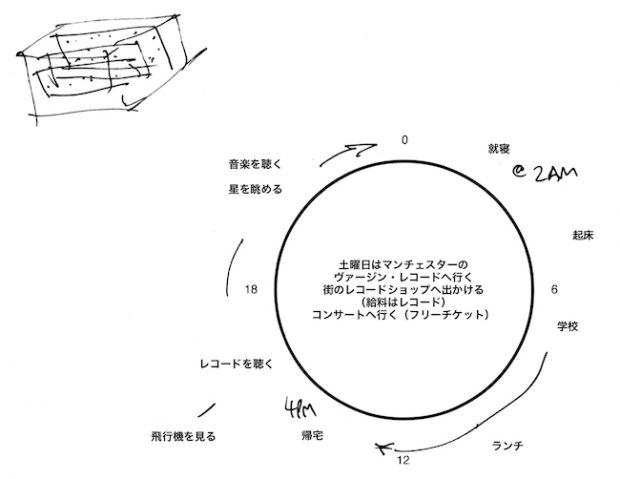
ーーでは、14歳のときにどんなことを考えていましたか?
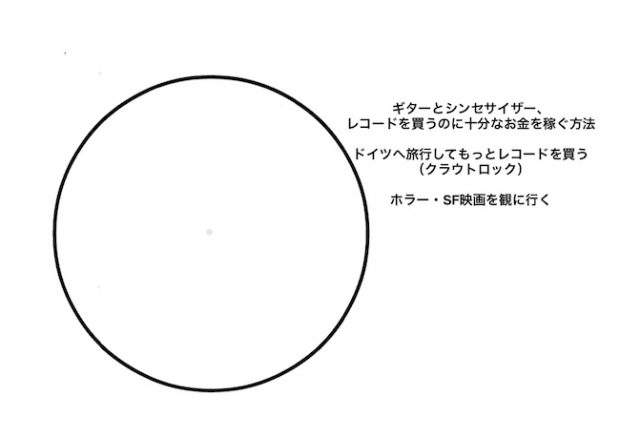
ーー当時の思い出でよく覚えていることがあれば教えてください。
マーク「初めてのライブですね。11月でたしか木曜日の夜、マンチェスターの『Hardrock』へロキシー・ミュージックのライヴをこっそり観に行きました。放課後会場へ行き、困っていたローディーを手伝ってフリーチケットを手にしたんです。母には友達の家でロキシー・ミュージックを聴いてくると伝えて、市内へ向かうバスに乗り込みました。会場では学校の制服の影に隠れて人間観察。この抽象的な大人の世界に10代の自分はとても場違いだと感じたんですよ。今まで全く見たことがない光景。みんな酔ってましたね。何人かのファンは完全なグリッター・ギア、プラットフォームシューズ、染めた髪にメイクアップやドレスアップとまるでパントマイマーのようでした。彼らはステージの正面で踊り、ブライアン・フェリーに叫ぶんです。当時はブライアン・イーノもメンバーだった頃。彼は色とりどりのヘアーにフェザーとファーを纏い、その姿はまるでエイリアン。わたしはすっかり魅了されました」
ーー14歳のときに抱いていた夢は何ですか?
マーク「イギリス空軍に入隊することを考えていたので、航空士官候補生の学校に参加したんです。そこで軍隊の規律や訓練、射撃と更新の仕方について学びました。一番よかったのは制服を手に入れたことですね。でもロキシー・ミュージックのライブを観た後、空軍には行かないと自覚しました。その代わりグラフィックデザイナーになってレコードのカバーや広告をデザインしたいと思ったんです」
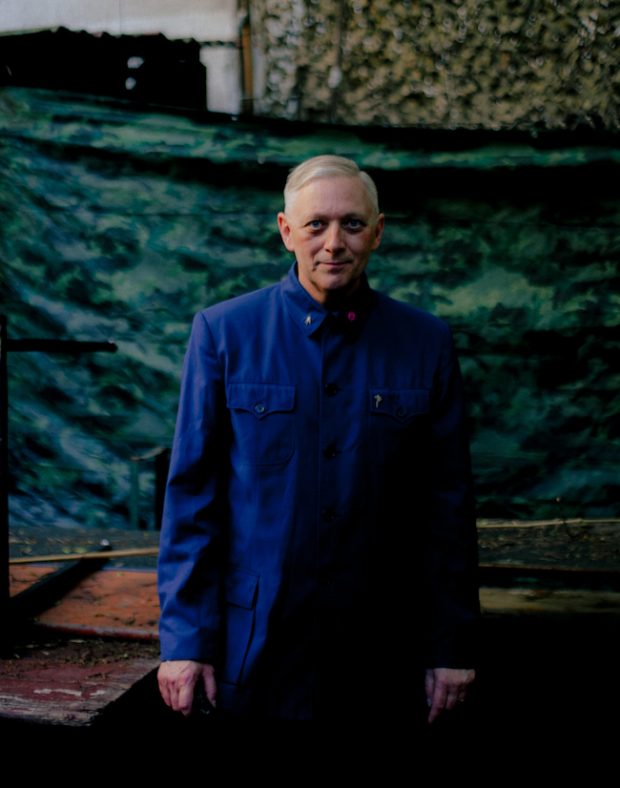
ーー最初はレコードショップで働いていたそうですね。どういう経緯で始まったのですか?
マーク「土曜日は一日中マンチェスターのレコードショップをチェックして、古いレア作品を探しまわったり、新しい音楽を聴いたりしていました。その頃オープンした『ヴァージン・レコード』はわたしのお気に入りショップ。そこのスタッフたちはレコードを提案してくれるので、閉店までそこで過ごしましたよ。次第にショップを手伝ってほしいと頼まれるのですが、最初のうちはお金ではなくレコードが給料(必ずレコードを買うと知っていたので、お金よりもレコードをもらう方が価値があったんです)。1976年までフルタイム勤務でしたね。高校を卒業して芸術大学へ進学し、広告の心理学とグラフィック・デザイナーになる方法について学びました。短期間だけ広告代理店で働きましたが、それが嫌でレコードショップに戻ったんです。広告の世界は自分には合いませんでしたね」
ーー当時はいくつかのバンドにも所属していましたよね。
マーク「ジョー・スターリンズ・レッド・スター・レディオ・バンドに所属していました。友達の家のリビングで練習してましたよ。メンバーはレッド・ツェッペリンの”Free Bird”や“Stairway to Heaven”のカバー曲を演奏したいだけだったので、わたしは抜けることに。それから芸大の友達ミック・ハックネルからパンクバンドを組まないかと声をかけられたんです。バンド名はフランティック・エレヴェイターズ。何度かライブをしたのですが、1978年にわたしはバンドを抜けてしばらくヨーロッパを旅行すると決めたんです。最終的にベルリンへたどり着き、それ以来ずっとここにいますね」
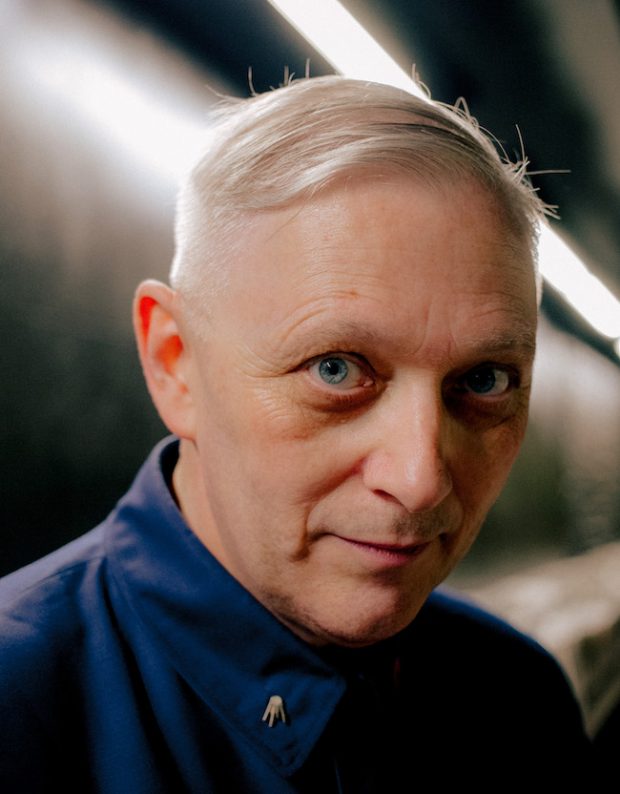
"B-Movie: Lust & Sound in West-Berlin 1979–1989 (2015)"
ーーこの仕事を始めてよかったこと、大変なことはありますか?
マーク「人生には浮き沈みがあります。それはわたしたちを定義するものだから、誰もが人生で経験すべきシチュエーションです。わたしにもよかったこと辛かったことがたくさんありました。リスクなしでは、楽しみも冒険もありません。たしかに他の人よりも気がめいることを上手く処理できる人はいますし、誰もがわくわくすることと向き合えますよね。要は辛いことが起きたときにどう対処するかです。辛い経験はあなたが受けてきたよかった経験について気付かせてくれるし、そうあるべき。わたしにとって成功とはどれだけお金を稼ぐか、どんな車に乗るかではなく、人生の障害をどう乗り越えていくかということなんです。改めて浮き沈みの多い冒険のような人生を送ってきたと思います。60年代から今日までその時代の音楽とともに生きてきたこと、世界中の素晴らしい音楽をまだ発掘できることは大変光栄ですね。中国のストールン(STOLEN)、マンチェスターのマックス・モリソン、ニューヨークのザック・スターキー、日本のアービー(A-Bee)とか」
ーーどんな音楽を聴いていましたか?
マーク「ロキシー・ミュージックの1stアルバム『Roxy Music (1972)』、ホークウインドの『宇宙の探求 (In Search Of Space, 1971)』と”Silver Machine (1972)”、デヴィッド・ボウイの『Hunky Dory (1971)』、イギー・アンド・ザ・ストゥージズの『淫力魔人 (Raw Power, 1973)』、MC5の『Kick Out the Jams (1969)』、ルー・リードの『Transformer (1972)』、ブラック・サバスの”Children of the Grave (1971)”、ディープ・パープルの『Deep Purple in Rock (1970)』。レッド・ツェッペリン、ジミ・ヘンドリックス、ピンク・フロイド、ゴングの全作品。あとはゲイリー・グリッターやT・レックス、ノーザン・ソウル系やテンプテーションズのようなポップ系も聴いてましたね。コズミック・ジョーカーズ、タンジェリン・ドリーム、クラウス・シュルツェ、クラフトワーク、カン、ポポル・ヴー、ファウストといったクラウトロックにも出会いました」
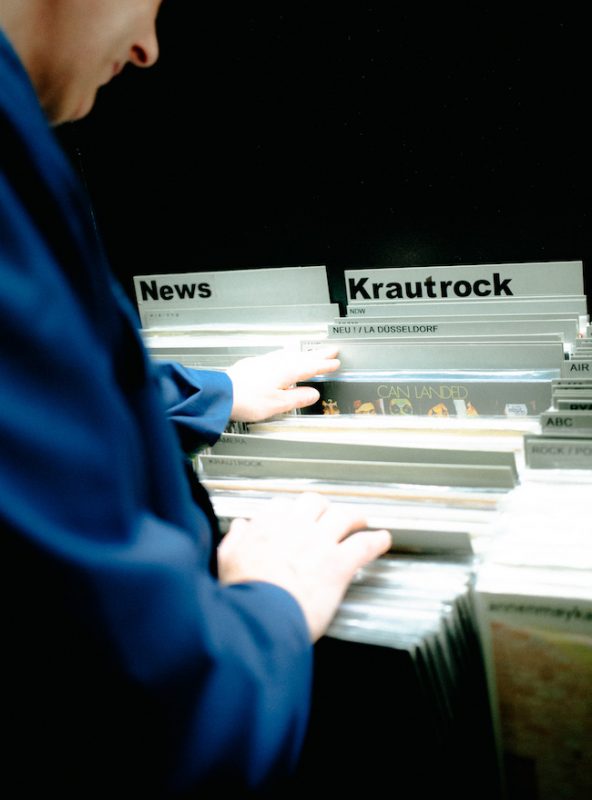
ーー14歳のときに影響を受けた、大好きだったものはありますか?
マーク「ジョージ・オーウェルの『1984年 (1949)』、ジャージ・コジンスキーの『異端の鳥 (The Painted Bird, 1965)』、オルダス・ハクスリーの『すばらしい新世界 (Brave New World, 1932)』ですね。エジプト学や科学的事実に関する本、『失われた世界 (The Lost World, 1912)』のようなファンタジー、『衝突する宇宙 (Worlds in Collision, 1950)』のようなSF、『未来の記憶 (Chariots of the Gods?, 1968)』、ノストラダムスの四行詩も読みました。
映画を観に行くお金はなかったのですが、『アギーレ/神の怒り (Aguirre, the Wrath of God, 1972)』や『スローターハウス5 (Slaughterhouse-Five, 1972)』、『猿の惑星・征服 (Conquest of the Planet of the Apes, 1972)』やトラッシーなホラー映画を観ましたよ」
ーーいま14歳を生きている人たちにお勧めしたい作品はありますか?
マーク「そうですね。『1984年』や『すばらしい新世界』、あるいは『レンヌ=ル=シャトーの謎 – イエスの血脈と聖杯 (The Holy Blood and the Holy Grail, 1982)』『The Hiram Key』から読み始めてはどうかな」
ーー最後に何かお知らせがあればどうぞ。
マーク「10月にニューオーダーのヨーロッパツアーがあります。オープニングアクトはわたしがプロデューサー兼マネージャーを担当するチャイニーズバンド、ストールンです。彼らのデビューアルバム『Fragment』が国内レーベルU/M/A/Aよりリリースされています。石野卓球が”Chaos”の素晴らしいリミックスを手掛けてくれました。アービーのリミックスも最高ですよ。自分の作品については、新作アルバムのリミックスとトラックを制作中です」
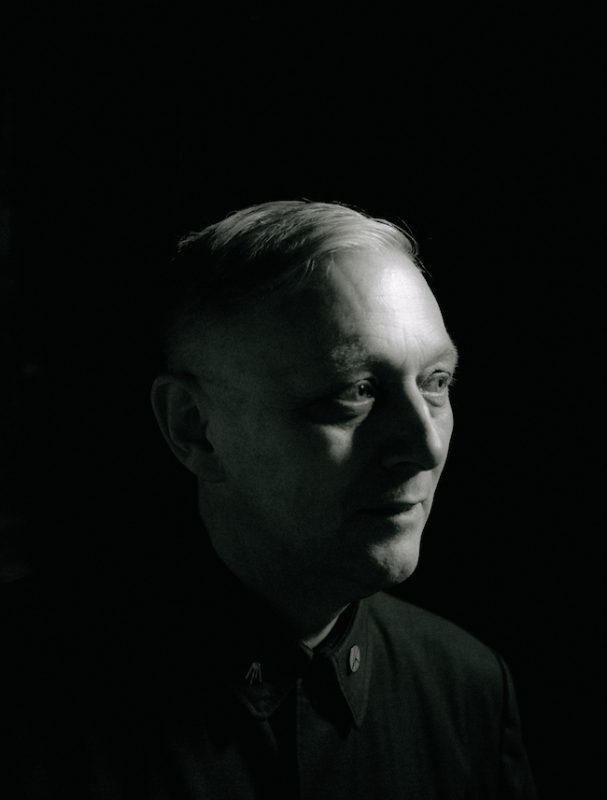
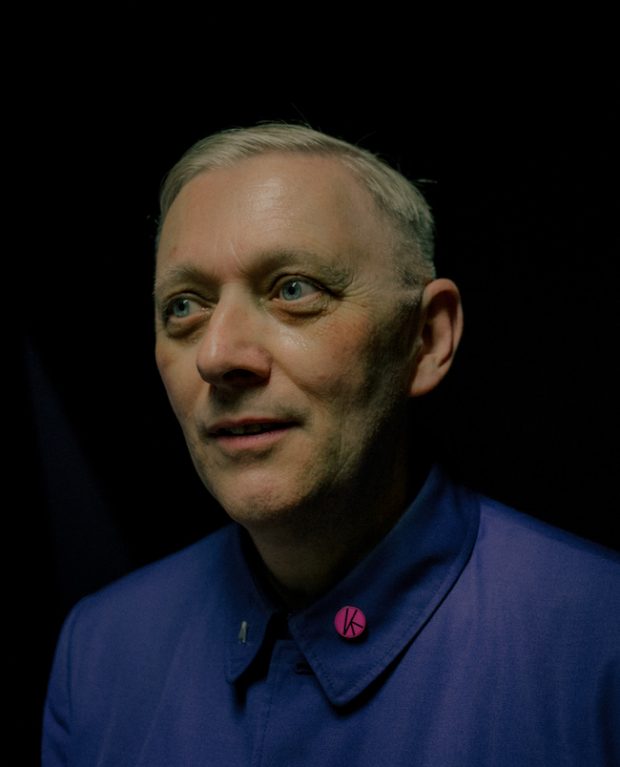
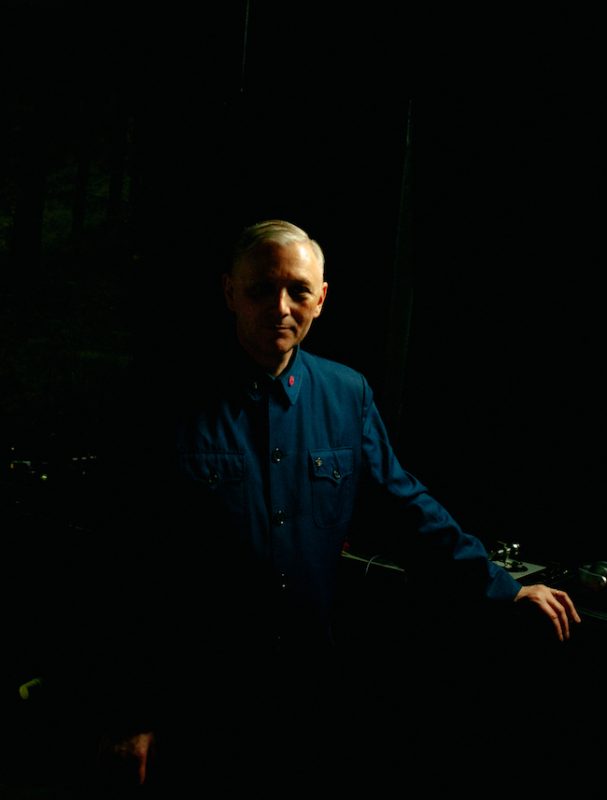
Mark Reeder
www.mfsberlin.com
@markreeder.mfs:https://www.instagram.com/markreeder.mfs/
photography Tereza Mundilová
text Yukiko Yamane
(This interview is available in English)
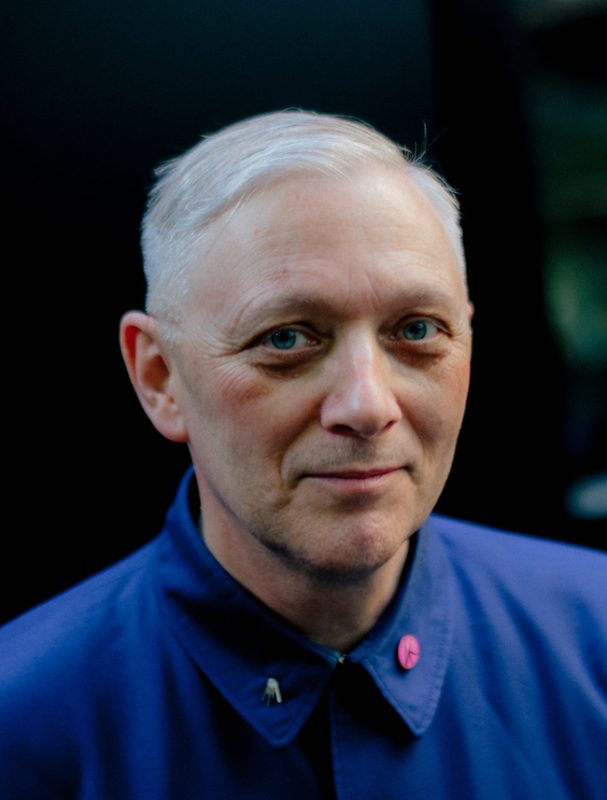
Age is just a number and there is no clear definition of being what is an adult and every person is different. We can’t define it, so everybody is looking for their own answers in life. 14 is a sensitive age. It’s when you start thinking about your own future, so we wanted to make a series of age 14. After the Tokyo and New York issue, we selected 15 people in Berlin who have very diverse background, different ages and professions for 14 Issue in Berlin.
Fourteenth interview is with British record producer and musician Mark Reeder. He left his birthplace Manchester and arrived in West Berlin in 1978 and quickly became engrained in the local community. He continued to make efforts in the early electronic music scene and DJ culture in Berlin and across the world. In 2015 he was the face of hit documentary “B-Movie: Lust & Sound in West-Berlin 1979–1989”. We interviewed him about growing up as a teenager in Manchester including lots of music and passion.
—Could you tell us about yourself when you were 14 years old?
Mark: I was 14 in 1972. It was the dawn of glitter (the precursor to glam-rock) I was into Roxy Music, Gary Glitter and David Bowie, but I also listened to a lot of what was considered then to be progressive rock too. I was a very alternative kid. I was constantly being bullied at school for being different and liking different “weird” music and dressing differently (at school we had to wear a uniform, but I would adapt it the best I could with army uniform stuff). I was called all kinds of names and the class would always do everything they could to humiliate me. They made me class speaker because they thought it would embarrass me, but what it did was to make me harder, more resilient and confident. I hung around record shops, read books and made model aeroplanes, while they all played football.
—What did you do in those days?
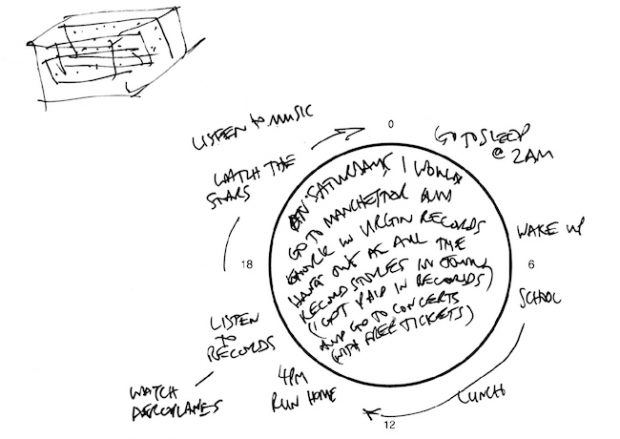
—What did you think about at age 14?
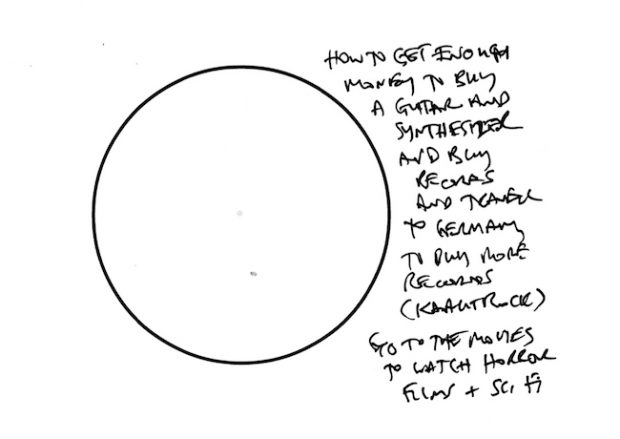
—Please tell us your most memorable moment at age 14?
Mark: My first gig. Secretly going to see Roxy Music on a misty Thursday night in November at the “Hardrock” in Manchester. I had gone there after school and asked the bemused roadies if they needed any help and I got a free ticket. I told my mum I was going to a friend to listen to Roxy music, then caught the bus into town. Being a teenager, I just stood hiding in the shadows in my school uniform, watching how the people behaved. I felt so out of place in this abstract adult world. I had never seen anything like it. Everyone seemed drunk. A few fans were dressed up in complete glitter gear, platform shoes, dyed hair, make-up. It was a bit like pantomime. They hogged the front of the stage dancing and screaming at Bryan Ferry. Eno was also playing with Roxy then too. It looked like he had multicoloured hair and wore feathers and fur and he looked like an alien. I was fascinated by them.
—What did you want to do when you were 14 years old?
Mark: I was thinking about going into the Royal Air Force and I joined the Air cadets, just so I could go flying. There I learnt about military discipline and how to shoot and march and the best bit, I got a uniform. After seeing Roxy Music play live though, I realized I wasn’t going into the air force. I wanted to become a graphic designer and design record covers and adverts instead.

—You worked at record shop at first. How did you start your career?
Mark: I would check out Manchesters record shops all day on Saturday, scouring them for old rarities, or listening to new music. The recently opened Virgin record shop became my favorite shop, as I got on with the people who worked there, they would suggest records to me and I would spend all day in that little shop. Eventually, they asked me if I could help them out. At first, I got paid in records (which was worth more than any money they could have given me, because they knew I would have bought records with any money anyway). By 1976 I was working there full time. After leaving school, I went to art college and learned about the psychology of advertising and how to become a graphic designer. I worked very briefly for an an Ad agency, but hated it and went to work in the record shop. I knew the Ad world was not for me.
—Also you were a member of some bands then.
Mark: I joined a band “Joe Stalins Red Star Radio Band” we never did any gigs. We just practiced in my friends front room. He only wanted to play cover versions of freebird or stairway to heaven. I left the band, then Mick Hucknall my friend from art college asked me if I wanted to start a punk band. We called ourselves the Frantic Elevators. We did a few gigs, but by 1978, I had decided to leave the band and travel about Europe for a while, buying obscure records along the way. I ended up in Berlin and never left.

"B-Movie: Lust & Sound in West-Berlin 1979–1989 (2015)"
—What good and bad things have happened to you since you started your work?
Mark: Life has its ups and downs. We all need to go through these situations in life because these are the things that define us and everyone does. I’ve had loads of good things happen to me and loads of bad and loads of things I thought would be good but turned out bad and things I thought would be bad but turned out good. No risk, no fun, no adventure. For sure, some people can handle the downers better than others and we can all handle the uppers. It’s just about how you deal with the bad when it comes. The bad things should make you appreciate the good things. For me, success is not about how much money you make, or what kind of car you drive, it’s about how you get around life’s obstacles that counts. I think I have had a quite adventurous life when I look at it, full of ups and downs. Yet, I feel very privileged to have lived through the music of the 60s until today and that I can still find great new music from all over the world, from bands like STOLEN from China, or the brilliantly talented Max Morrison from Manchester, or Zach Starkey from New York or A-Bee from Japan.
—What kind of music did you listen at age 14?
Mark: The kind of music I usually listened to was stuff like Roxy Music’s first album, ”Silver Machine (1972)” or “In Search of Space (1971)” by Hawkwind, “Hunky Dory (1971)” by David Bowie, “Raw Power (1973)” by Iggy and the Stooges, “Kick out the Jams (1969)” by the MC5, “Transformer” by Lou Reed, “Children of the Grave (1971)” by Black Sabbath, “Deep Purple in Rock (1970)” by Deep Purple, everything by Led Zeppelin, Hendrix, Pink Floyd and Gong, but I also listened to poppier things like Garry Glitter, T. Rex or even some Northern Soul or The Temptations, and I discovered Krautrock like Cosmic Jokers, Tangerine Dream, Klaus Schultze, Kraftwerk, Can, Popol Vuh and Faust.

—What inspired you at age 14?
Mark: “1984 (1949)” by George Orwell, “The Painted Bird (1965)” by Jerzy Kosinski, “Brave New World (1932)” by Aldous Huxley and any books I could find about Egyptology, Science fact, or fantasy like “The Lost World (1912)”, Sci-Fi like “Worlds in Collision (1950)”, “Chariots of the Gods? (1968)” and the Quartrains of Nostradamus. I didn’t have the money for the cinema, but when I did, I’d watch movies like a “Aguirre Wrath of God (1972)”, “Slaughterhouse Five (1972)”, “Conquest of the Planet of the Apes (1972)” and trashy horror films.
—Is there anything you would recommend to 14 years olds?
Mark: Yes loads, but they can start with, “1984” by George Orwell or “Brave New World” by Aldous Huxley, or “The Holy Blood and the Holy Grail (1982)”, or “The Hiram Key”.
—Do you have any upcoming news that you want to share with the readers?
Mark: In October 2019 I will be bringing STOLEN over, a great new Chinese band that I produced and manage, to play as support act for New Order on their European tour. I have just licensed their album “Fragment“ to U/M/A/A records in Japan and Takkyu Ishino has made a wonderful remix of the single “Chaos” for me. Also A-Bee has made a great remix for it too. In the meantime I am working on my own new album of remixes and tracks too.



Mark Reeder
www.mfsberlin.com
@markreeder.mfs:https://www.instagram.com/markreeder.mfs/
photography Tereza Mundilová
text Yukiko Yamane
関連記事のまとめはこちら
https://www.neol.jp/music-2/
この記事に関連するニュース
-
【動画】追加支援でウクライナ軍が受け取るストームシャドウ、ハスキー、ATACMSの実力
ニューズウィーク日本版 / 2024年4月24日 16時4分
-
面接対策から日常会話まで、「日本語のオンラインプライベートレッスン」5月生・6月生の募集を開始!
PR TIMES / 2024年4月17日 9時45分
-
生産間接材購買プロセスDX革新「D-JIT(ディージット)」 をサービスイン<English Follows>
PR TIMES / 2024年4月15日 13時15分
-
【東京グレートベアーズ】ラファエル・アラウージョ選手 退団のお知らせ
PR TIMES / 2024年4月11日 18時40分
-
芸能事業「UQプロダクション」を開始し、社長自らアーティストデビュー
PR TIMES / 2024年4月2日 12時15分
ランキング
-
1【カルディ】見つけたら即ゲットして! 超人気商品「ウイスキープリン」は食べて驚く本格派スイーツ
オールアバウト / 2024年4月26日 20時35分
-
2「スマホから変な音する」奇妙な現象、7時間後に予期せぬ真相発覚 ネットずっこけ「そんなことある?笑」
よろず~ニュース / 2024年4月26日 18時20分
-
3Z世代が選ぶ「ゴールデンウィークあるある」トップ10発表! - 「どこに行っても激混み」「結局家が落ち着く」「昼夜逆転」を抑えた1位は?
マイナビニュース / 2024年4月26日 16時27分
-
4ねんきん定期便の見込額に注意!年金から天引きされる4つのお金を知っておこう
オールアバウト / 2024年4月25日 21時20分
-
5成分足りない「正露丸」、30年以上前から虚偽の試験結果で出荷…富山のキョクトウに業務停止命令
読売新聞 / 2024年4月26日 23時24分
記事ミッション中・・・
記事にリアクションする
![]()
記事ミッション中・・・
記事にリアクションする

エラーが発生しました
ページを再読み込みして
ください



